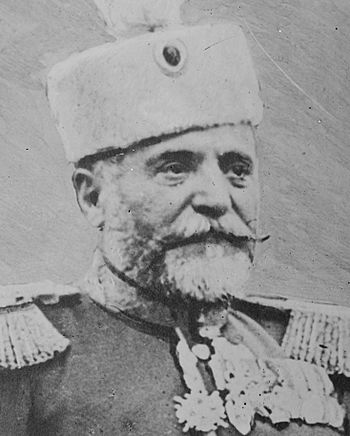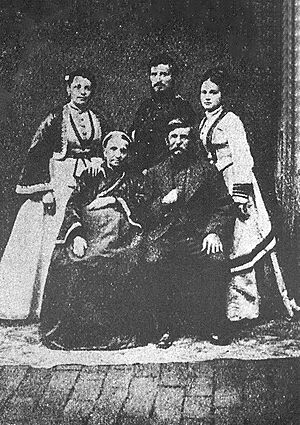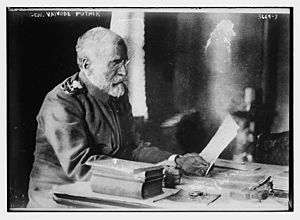Radomir Putnik facts for kids
Quick facts for kids
Vojvoda
Radomir Putnik
|
|
|---|---|
 |
|
| Chief of Staff of the Supreme Command of the Serbian Army | |
| In office 8 October 1912 – 8 December 1915 |
|
| Monarch | Peter I |
| Preceded by | Himself |
| Succeeded by | Petar Bojović |
| Chief of the Serbian General Staff | |
| In office 19 September 1912 – 8 October 1912 |
|
| Monarch | Peter I |
| Preceded by | Himself |
| Succeeded by | Himself |
| In office 1908 – 19 September 1912 |
|
| Monarch | Peter I |
| Preceded by | Petar Bojović |
| Succeeded by | Himself |
| In office 1903–1905 |
|
| Monarch | Peter I |
| Preceded by | Svetozar Nešić |
| Succeeded by | Aleksandar Mašin |
| In office 1890–1892 |
|
| Monarch | Alexander I |
| Preceded by | Jovan Mišković |
| Succeeded by | Jovan Mišković |
| Minister of War | |
| In office 17 April 1906 – 30 March 1908 |
|
| Prime Minister | Sava Grujić Nikola Pašić |
| Preceded by | Sava Grujić |
| Succeeded by | Stepa Stepanović |
| In office 26 January 1904 – 16 May 1905 |
|
| Prime Minister | Sava Grujić Nikola Pašić |
| Preceded by | Milan Andrejević |
| Succeeded by | Vasilije Antonić |
| Personal details | |
| Born | 24 January 1847 Kragujevac, Principality of Serbia |
| Died | 17 May 1917 (aged 70) Nice, France |
| Resting place | New Cemetery Belgrade |
| Spouse | Ljubica Putnik (1879–1917; his death) |
| Children | Ljubiša Putnik Borivoje Putnik Mila Putnik Milica Putnik Radojka Putnik Dimitrije Putnik Vladimir Putnik |
| Alma mater | Military Academy Serbia |
| Profession | Army officer |
| Awards | (full list in the article) |
| Military service | |
| Allegiance | |
| Branch/service | Serbian Army |
| Years of service | 1861–1896 1903–1917 |
| Rank | |
| Battles/wars |
|
Field Marshal Radomir Putnik (Serbian: Радомир Путник; born January 24, 1847 – died May 17, 1917) was a very important military leader in Serbia. He was the first Serbian Field Marshal, which is the highest rank in the army. He also served as the Chief of the General Staff for the Serbian army during the Balkan Wars and First World War. Putnik fought in every war Serbia was involved in from 1876 until 1917.
Contents
Radomir Putnik's Early Life
The Putnik family originally came from Kosovo. They moved to the Habsburg Monarchy in 1690 during a big migration of Serbs. Later, in the mid-1800s, the family returned to the Principality of Serbia. This was the first modern Serbian state that was free from Ottoman rule.
Radomir's father, Dimitrije, was a teacher in Kragujevac. Radomir finished his basic schooling there. He then went to the Artillery School in Belgrade, which later became the Military Academy. He graduated in 1863, ranking eighth in his class. In 1879, he married Ljubica Bojović and they had seven children together. People who knew Putnik described him as a quiet and serious man who smoked a lot. He was also very strong-willed about his work.
Putnik showed his skills as a military leader during Serbia's wars against the Ottomans between 1876 and 1878. He led troops that captured towns like Gnjilane and Gračanica in Kosovo. Even though he was a skilled officer, Putnik sometimes had disagreements with King Milan I and later King Alexander I. These disagreements made it harder for him to advance in his career. In 1895, the king forced him to retire.
A New Start: Working with King Peter I
After a change in government in 1903, Radomir Putnik was brought back into the army. The new king of Serbia, Peter I Karadjordjević, promoted him to general. Putnik was then made the Chief of the General Staff. He worked hard to reorganize the Serbian army. He retired older officers and promoted new ones. He also updated the army's battle plans.
Putnik served as Serbia's Minister of War three times: in 1904, from 1906 to 1908, and in 1912. He appointed General Živojin Mišić as his second-in-command. Even though they sometimes had different ideas, they respected each other deeply. In 1912, Putnik became the first officer to reach the highest rank of Field Marshal.
He led the Serbian Army to amazing victories in the First Balkan War against the Ottomans. Key battles included the Battle of Kumanovo in October 1912 and the Battle of Monastir in November 1912. He also led the army in the Second Balkan War against Bulgaria in 1913. Putnik had prepared his troops well for the Bulgarian attack, placing them in important spots near the Bregalnica river. This helped Serbia win quickly.
Leading Serbia in World War I
When Austria-Hungary declared war on Serbia, Field Marshal Putnik was in Budapest. Surprisingly, the Austro-Hungarian emperor, Franz Josef, allowed him to return safely to Serbia. After a difficult journey, Putnik arrived back home. He offered to resign because of his age and poor health. However, King Peter I of Serbia refused his resignation. The king insisted that Putnik lead the army, at least in terms of strategy. Younger generals like Stepa Stepanović, Živojin Mišić, and Petar Bojović would handle the day-to-day operations.
Even though Putnik had to spend most of his time in a warm room due to his health, he successfully planned the campaign. Serbia managed to defeat the Austro-Hungarian Army's attacks in August and September 1914. These included the battles of Cer and Kolubara. By December 1914, the Austro-Hungarian army was driven out of Serbia.
In early 1915, Prince Alexander wanted to take direct command of the army from Putnik. Putnik refused, saying it was against the law and that a king couldn't take on such a big responsibility. The front lines in Serbia remained quiet until autumn 1915. Then, a huge force of over 300,000 soldiers from Austria-Hungary, Germany, and Bulgaria attacked Serbia. Before this attack, Putnik had warned the Serbian government that Bulgaria was gathering troops. He suggested a surprise attack on Bulgaria to avoid fighting on two fronts. But his idea was rejected because the Allies hoped to keep Bulgaria from joining the other side.
Despite brave resistance, the Serbian troops had to retreat towards Kosovo. On October 31, Putnik ordered a general retreat to Kragujevac. He tried to keep his tired army together as they tried to escape to friendly territory. Many soldiers, who were farmers, sometimes left the army to go back to their farms. Putnik's weakening forces continued their retreat towards Albania in November 1915. The enemy armies didn't chase them through the mountains of Albania. The Germans felt they had won the war against Serbia. The Bulgarians were happy with the land they had gained.
The final big fight happened in Kosovo, at the Field of the Blackbirds, from November 19 to 24, 1915. The Serbs were suffering from a new outbreak of typhus disease. They also had very little food and ammunition. Facing certain defeat, Putnik gave his last and most difficult order on November 25. He ordered a full retreat south and west through Montenegro and into Albania. His goal was to reach Allied ships that he hoped would take the army to safety on the Ionian islands. Many soldiers and civilians died during this difficult retreat through the snowy mountains. They suffered from hunger, disease, and attacks. About 155,000 Serbs, mostly soldiers, eventually reached the coast of the Adriatic Sea. They boarded Allied ships that took them to various Greek islands, especially Corfu. From there, they were sent to the Salonika front in April 1916.
His Final Years
Putnik's health got worse during the retreat. He had to be carried in a special chair through the snowy mountains of Albania. He was exhausted and suffered from bronchitis, flu, and pneumonia. Allied forces met Putnik in Scutari (Skadar) and took him first to Brindisi and then to Corfu, along with the rest of the army.
After the retreat, there were many disagreements between the Serbian Government and the army leaders. In January 1916, the entire General Staff was dismissed, including Field Marshal Putnik. He felt very sad about this, especially when he learned about his dismissal from a cashier. He traveled to Nice, France, where the French authorities welcomed him with honors and gave him a villa. Putnik was very ill with a lung disease and died on May 17, 1917. He never saw his homeland again. His body was brought back to Serbia in November 1926. He was buried with honors in a chapel at Belgrade's New Cemetery. His grave has the words: "Grateful Homeland to Radomir Putnik."
Legacy
Mount Putnik in Alberta, Canada was named after him in 1918. This was to honor his great help to the Allied forces during the war. He is also listed among The 100 most prominent Serbs.
Images for kids
-
Royal Serbian Army HQ in modern-day Skopje
Quotes
'Troop concentration on paper is a quick and easy matter.'
- This was an ironic comment in a letter to Andra Knićanin. He was talking about how hard it was to move the Serbian army across very difficult land at the start of the Serbo-Turkish war of 1878.
'Those were only skirmishes with Turkish rearguards.'
- Putnik said this when he first heard about the Battle of Kumanovo. The Serbian High Command thought a bigger battle was still coming. Also, they heard about the battle after it was already won because of communication problems.
See also
 In Spanish: Radomir Putnik para niños
In Spanish: Radomir Putnik para niños
 | Toni Morrison |
 | Barack Obama |
 | Martin Luther King Jr. |
 | Ralph Bunche |







